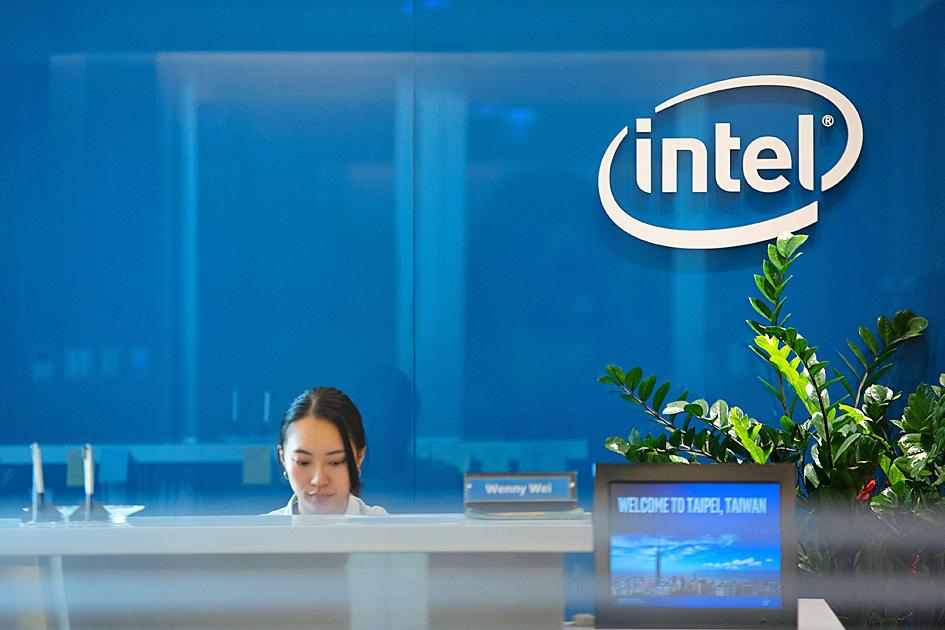Intel Corp has talked with Taiwan Semiconductor Manufacturing Co (TSMC, 台積電) and Samsung Electronics Co about the Asian companies making some of its best chips, but the Silicon Valley pioneer is still holding out hope for last-minute improvements in its own production capabilities.
After successive delays in its chip fabrication processes, Santa Clara, California-based Intel has yet to make a decision less than two weeks ahead of a scheduled announcement of its plans, people familiar with the deliberations said.
Any components that Intel might source from Taiwan would not come to market until 2023 at the earliest and would be based on established manufacturing processes already in use by other TSMC customers, said the people, asking not to be identified because the plans are private.

Photo: Ashley Pon, Bloomberg
Talks with Samsung, whose foundry capabilities trail TSMC’s, are at a more preliminary stage, the people said.
TSMC and Samsung representatives declined to comment, while an Intel spokesperson referred to previous comments by CEO Bob Swan, who has promised investors he would set out his plans for outsourcing and putting Intel’s production technology back on track when the company reports earnings on Thursday next week.
TSMC, the largest maker of semiconductors for other companies, is preparing to offer Intel chips manufactured using a 4-nanometer process, with initial testing using an older 5-nanometer process, the people said.
The company has said it would make test production of 4-nanometer chips available in the fourth quarter of this year and volume shipments the following year.
TSMC expects to have a new facility in Hsinchu County’s Baoshan Township (寶山) operational by the end of this year, which can be converted to production for Intel if required, one of the people said.
TSMC executives previously said the Baoshan unit would house a research center with 8,000 engineers.
Intel’s strategic shifts are happening at a time of booming demand, as well as technological change in the chip industry.
The traditional method of improving performance by shrinking and cramming more transistors into each package is being supplanted by more sophisticated techniques that include stacking processor and memory components into single chips and the introduction of more tailored designs for tasks like artificial intelligence.
Separately, United Microelectronics Corp (UMC, 聯電) on Saturday had power-supply disruptions at two plants in Hsinchu that temporarily affected production, UMC chief financial officer Liu Chi-tung (劉啟東) said.
“The company will discuss with customers, and try its best to make up for lost production,” Liu said by telephone. “No major financial impact is expected.”
The overall impact of the incident was “quite minor,” Liu said.
Power was being gradually restored, he said.

South Korea’s equity benchmark yesterday crossed a new milestone just a month after surpassing the once-unthinkable 5,000 mark as surging global memory demand powers the country’s biggest chipmakers. The KOSPI advanced as much as 2.6 percent to a record 6,123, with Samsung Electronics Co and SK Hynix Inc each gaining more than 2 percent. With the benchmark now up 45 percent this year, South Korea’s stock market capitalization has also moved past France’s, following last month’s overtaking of Germany’s. Long overlooked by foreign funds, despite being undervalued, South Korean stocks have now emerged as clear winners in the global market. The so-called “artificial intelligence

Chinese artificial intelligence (AI) start-up DeepSeek’s (深度求索) latest AI model, set to be released as soon as next week, was trained on Nvidia Corp’s most advanced AI chip, the Blackwell, a senior official of US President Donald Trump’s administration said on Monday, in what could represent a violation of US export controls. The US believes DeepSeek will remove the technical indicators that might reveal its use of American AI chips, the official said, adding that the Blackwells are likely clustered at its data center in Inner Mongolia, an autonomous region of China. The person declined to say how the US government received

‘SEISMIC SHIFT’: The researcher forecast there would be about 1.1 billion mobile shipments this year, down from 1.26 billion the prior year and erasing years of gains The global smartphone market is expected to contract 12.9 percent this year due to the unprecedented memorychip shortage, marking “a crisis like no other,” researcher International Data Corp (IDC) said. The new forecast, a dramatic revision down from earlier estimates, gives the latest accounting of the ongoing memory crunch that is affecting every corner of the electronics industry. The demand for advanced memory to power artificial intelligence (AI) tasks has drained global supply until well into next year and jeopardizes the business model of many smartphone makers. IDC forecast about 1.1 billion mobile shipments this year, down from 1.26 billion the prior

FORTUNES REVERSED: The new 15 percent levies left countries with a 10 percent tariff worse off and stripped away the advantage of those with a 15 percent rate In a swift reversal of fortunes, countries that had been hardest hit by US President Donald Trump’s tariffs have emerged as the biggest winners from the US Supreme Court’s decision to strike down his emergency levies. China, India and Brazil are among those now seeing lower tariff rates for shipments to the US after the court ruled Trump’s use of the International Emergency Economic Powers Act to impose duties was illegal. While Trump subsequently announced plans for a 15 percent global rate, Bloomberg Economics said that would mean an average effective tariff rate of about 12 percent — the lowest since